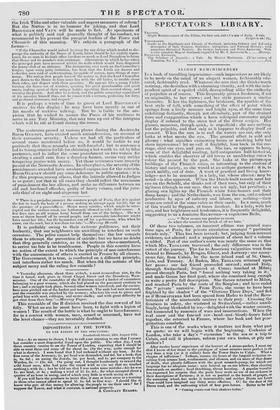"There is a prejudice amongst the common people of Paris,
that it is against the law to touch the body of a person making an attempt upon his life, but in the presence of a peace-officer. Hence many suicides, which might be inter- rupted and the victims saved, are barbarously allowed to take their course. A few days ago, an old woman hung herself from one of the bridges. She was seen to throw herself off by several people, and a seasonable interference might have saved her life; hut the bystanders ran off for a policeman, who, when he came, cut the cord, but it was then too late."—.111i)rniny Herald.
It is probably owing to their extreme politeness, not their barbarity, that our neighbours are unwilling to interfere on such occasions. The police cannot help themselves: the law compels them to attempt the prevention of suicide ; but we have no doubt that they generally contrive, as in the instance above-mentioned, to arrive too late to be troublesome. People in this country have no notion of the extent to which the principle of non-interference with the amusements of others is carried in France by all classes. The Government, it is true, is conducted on a different principle, and interferes rather too much. But when did the notions of the subject many and the ruling few coincide?


















 Previous page
Previous page